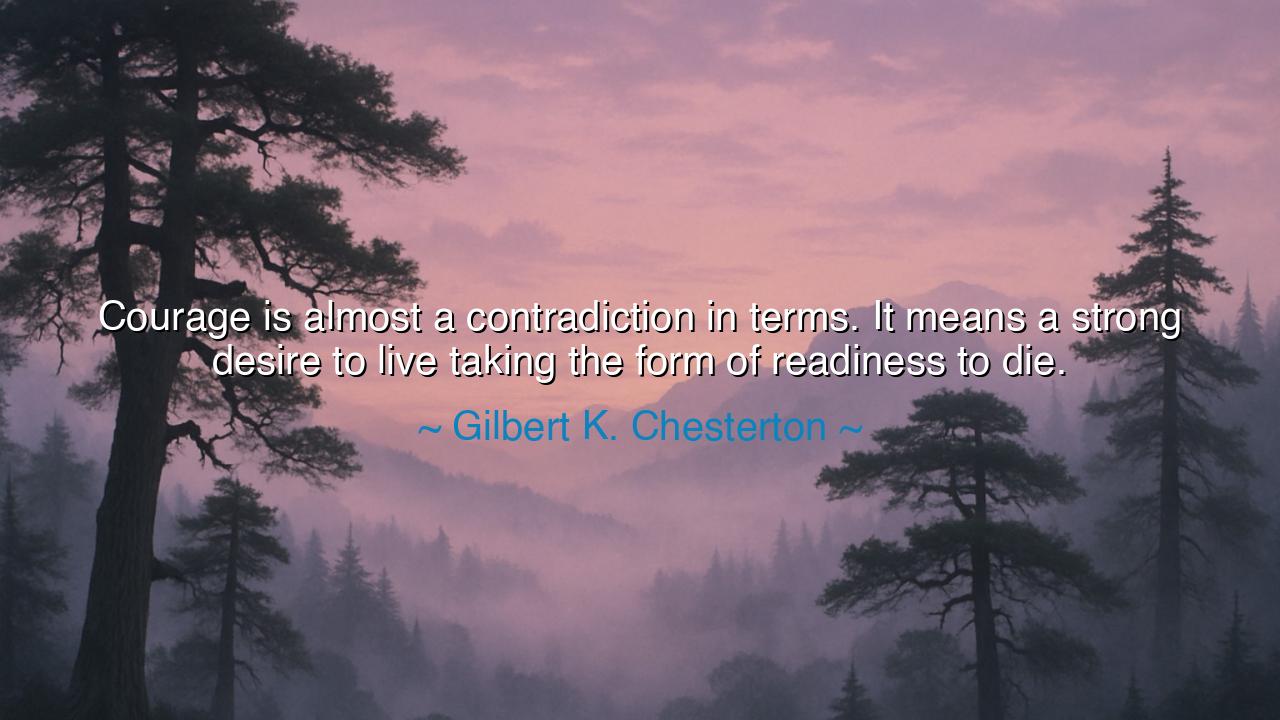
Courage is almost a contradiction in terms. It means a strong
Courage is almost a contradiction in terms. It means a strong desire to live taking the form of readiness to die.






Hear now the profound words of Gilbert K. Chesterton, the English philosopher and writer whose pen carved wisdom into paradox: “Courage is almost a contradiction in terms. It means a strong desire to live taking the form of readiness to die.” In this single sentence, Chesterton captures the eternal riddle of the human spirit—that the bravest hearts are not those who seek death, but those who love life so deeply that they are willing to risk it for something greater. For courage is born from love, not from hatred of life; it is the flame that burns brightest when life itself is most threatened.
Chesterton lived in a time of moral and social upheaval—the early twentieth century, when Europe stood on the edge of modern war, and men began to question the nature of heroism and faith. His words arise from a world both weary and defiant, a world learning that strength does not always roar from the battlefield, but often whispers in the heart. When he wrote of courage, he was not merely speaking of soldiers and heroes, but of the quiet valor of every soul who faces fear without surrender. For to be ready to die while still cherishing life is to hold within oneself both fire and tenderness—the perfect balance of passion and restraint that defines the human condition.
This “contradiction” of courage has echoed through every age. The samurai of Japan, bound by their code of bushido, understood it well. They trained their minds to accept death so that they might live each moment more fully and act without hesitation. To the samurai, fear of death weakened the spirit, but disregard for life dishonored it. The true warrior walked the middle path—loving life, yet ready to die for what was right. In their discipline we see the truth of Chesterton’s words: courage is not recklessness, but mastery over the self.
Consider also the story of Joan of Arc, the young maiden who led armies under divine conviction. She was but a child of the fields, yet she spoke with the strength of kings. When condemned to burn at the stake, she trembled not from fear, but from faith. Her heart clung to life—she wept for it, prayed for it—but she would not renounce her mission to save it. In her final hour, she revealed the paradox of courage: she desired life so fiercely that she gave it up willingly for truth. Thus, her death became her immortality, and her flame, extinguished by men, lit the path for centuries to come.
Chesterton’s insight reveals that courage is not the absence of fear, but its transformation. The coward flees because he loves his life selfishly; the courageous man stands firm because he loves life selflessly—his own and others’. In battle, in faith, in the trials of the heart, courage is the alchemy by which fear is transmuted into purpose. To face death with serenity is not to despise life, but to hold it so sacred that one refuses to live it dishonorably. The soldier who risks his life for his comrades, the mother who endures pain for her child, the reformer who faces persecution for truth—all are moved by the same sacred paradox: the desire to live, taking form as the readiness to die.
And yet, courage is not confined to battlefields or martyrdom. It dwells quietly in the daily acts of endurance and integrity. The worker who stands against injustice, the friend who speaks truth though it may cost affection, the soul who dares to begin again after loss—all live this contradiction. They love life enough to risk comfort, security, even reputation, for something more enduring. To be courageous in the world is to say: “I will not let fear decide how I live.”
Therefore, O listener, let this teaching take root in your heart. When fear rises within you, do not curse it—for fear is the raw material of courage. Feel it, understand it, and let it drive you not into retreat but into purpose. Remember always that to live bravely is not to chase death, but to honor life by standing unafraid in its defense. Live each day as one who treasures the gift of breath, yet who knows that its end is not defeat, but destiny.
For as Chesterton reminds us, courage is the divine contradiction that makes us human—the meeting point of love and sacrifice, of life and death, of weakness and strength. To be courageous is to walk the edge of both worlds, and to do so with peace in your heart. Therefore, love life greatly, but hold it lightly. Stand firm in what is right. And when the time comes to face your trials, let your courage speak as hers and his have spoken through the ages: “I live truly because I am ready, if need be, to die.”






AAdministratorAdministrator
Welcome, honored guests. Please leave a comment, we will respond soon